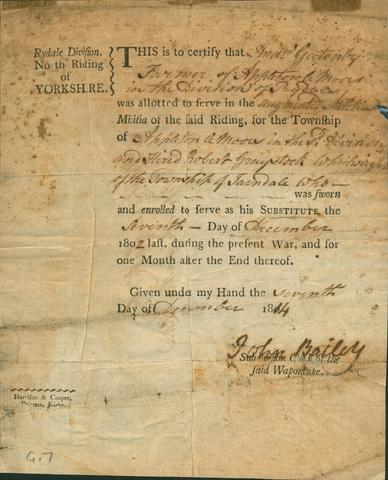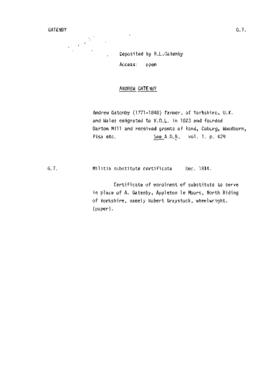
Identificatie
referentie code
Titel
Datum(s)
- 1814 (Vervaardig)
Beschrijvingsniveau
Collectie
Omvang en medium
1 paper certificate
Context
Naam van de archiefvormer
Biografie
Andrew Gatenby (1771-1848), farmer, was born at Scarborough, Yorkshire, England. He married Hannah, née Maw, of Whitby, and leased Barton farm, near Whenby in the North Riding of Yorkshire, for some time before 1812 when he moved to Wales and occupied a farm, Talymaes Park, in Grwyne Fechan, Breconshire. Depressed farming conditions and a high rental caused him to emigrate to Van Diemen's Land, and he sailed with his family in the Berwick, arriving in Hobart Town in June 1823. Andrew was granted 1500 acres (607 ha) which he selected on the Pennyroyal Creek (Isis River) and named Barton. By 1825 the Gatenby family had erected a substantial flour-mill, using millstones they had brought with them to the colony, and cut a canal and banked a reservoir to supply the mill with water from the Isis River. This mill served the surrounding district for fifty years. They built the Barton homestead by 1828. For more information see: http://adb.anu.edu.au/biography/gatenby-andrew-2083
Directe bron van verwerving of overbrenging
Deposited by R.L.Gatenby
Inhoud en structuur
Bereik en inhoud
Militia substitute certificate dated December 1814. Certificate of enrolment of substitute to serve in place of A. Gatenby, Appleton le Moors, North Riding of Yorkshire, namely Robert Graystock, wheelwright. Until the 19th century militia units were used in home defence and maintaining law and order in vulnerable locations such as Ireland and the south coast of England. Militia units did not have to serve overseas, but they were seen as a useful reserve of trained men. Bounties were offered to militiamen who exchanged into the regular Army for overseas service.
Many of the men serving in the militia were substitutes serving on behalf of those whose names had been drawn in the county ballot. These substitutes often made a charge for taking over the duties. When the militia was fully embodied on a permanent footing during periods of war, a higher figure could be demanded and obtained. The regiment benefited by receiving experienced soldiers instead of raw recruits.
.
Waardering, vernietiging en slectie
Aanvullingen
Ordeningstelsel
Voorwaarden voor toegang en gebruik
Voorwaarden voor raadpleging
Voorwaarden voor reproductie
This material is made available for personal research and study purposes under the University of Tasmania Standard Copyright Licence. For any further use permission should be obtained from the copyright owners. For assistance please contact Special.Collections@utas.edu.au
When reusing this material, please cite the reference number and provide the following acknowledgement:
“Courtesy of the UTAS Library Special & Rare Collections”
Taal van het materiaal
Schrift van het materiaal
Taal en schrift aantekeningen
Fysieke eigenschappen en technische eisen
Toegangen
Bestaan en verblifplaats van originelen
Bestaan en verblijfplaats van kopieën
Related units of description
Alternative identifier(s)
Trefwoorden
Onderwerp trefwoord
Geografische trefwoorden
Naam ontsluitingsterm
Genre access points
Identificatie van de beschrijving
Identificatiecode van de instelling
Toegepaste regels en/of conventies
Status
Niveau van detaillering
Verwijdering van datering archiefvorming
HE Jan 2018
Taal (talen)
Schrift(en)
Bronnen
Digitaal object metadata
Latitude
Longitude
mediatype
Afbeelding
Mime-type
image/tiff


